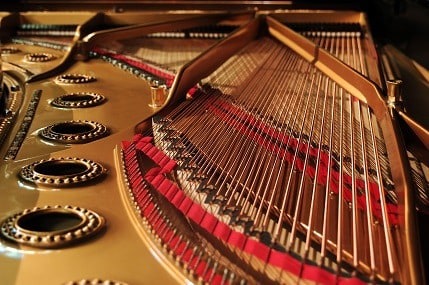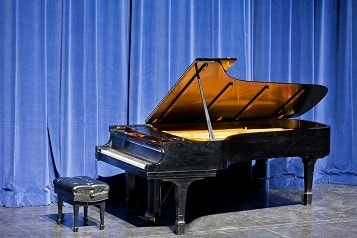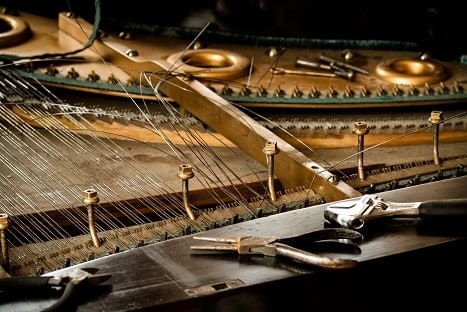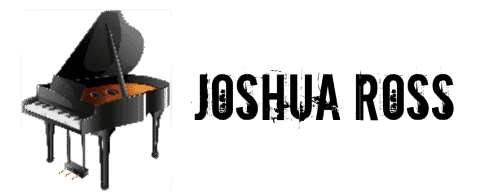As an Amazon Associate I earn from qualifying purchases.
When it comes to purchasing a piano, things can be really tough. It’s not an easy decision because there are so many brands to choose from. Those who are looking at top of the line models are really interested in two main brands; Steinway and Yamaha. But which one is actually better?
The difference between Yamaha and Steinway pianos is their pricing, sound quality, action and touch, and design. Steinway pianos are handmade with Canadian maple wood and Alaskan spruce. Yamaha’s use Japanese craftsmanship and parts from East Asia and manufactures many of their high-quality components in-house.
Want to Learn Piano?Click Here

Steinway Cost vs Yamaha Cost
One of the reasons people ask about Steinway and Yamaha is because their price points are so wide in contrast. The perception is that because a Steinway might retail at $190,000 that something must be terribly wrong with that $70,000 Yamaha. That’s not the case at all, and a lot of it comes down to marketing.

Taking a look at any pricing chart the lower end models of both new Steinway and Yamaha have the biggest price disparity. For example a 5′ 1″ Steinway grand costs around $69,000. Compare that to a Yamaha of a similar size costs between $21,900 – $34,000. Looking at the larger concert grand models that are between 7′ and 9′ there isn’t much wiggle room in price. A Yamaha CFX costs around $179,000 while a Steinway model D costs around the same price.
When you’re looking to save on a Steinway or Yamaha, the used market is your best chance to score a huge discount. This is where Steinway really dominates because their pianos are designed to last from one generation to the next.
A 1913 Steinway, for example, can be completely rebuilt with many of the same parts used in today’s pianos and still run lower than the cost of a new one. Used Steinway’s still tend to be more expensive than other piano brands though; although Fazioli pianos have a luxury price point.
Marketing, cost of goods, labor and a dwindling piano buyers market play a major role in the pricing of all pianos. While Yamaha prices have risen over the years, it remains a quality instrument for a reasonable price. Steinway, on the other hand, has seen substantial price raises in just the last decade alone.
Build Quality Of Yamaha And Steinway Pianos
While there are big differences between the materials used for high and low-end pianos, there’s not much distance when it comes to these two brands. Steinway uses high-quality spruce and maple from North American locations. The wood frame is thicker than other pianos and usually has a black mahogany finish which holds up well to forceful contact.

The keyboard is made with Bavarian spruce and it’s topped with polymer (most pianos were made with ivory before 1950). The model D features brass pedals, steel strings and copper wound bass strings. The frame also utilizes multiple layers of maple wood to make up the inner and outer rims. Unlike some other pianos, the soundboard is actually tapered which caters to the unique sound of each instrument. Click here for a full breakdown of the model D.
Yamaha pianos gather quality spruces, oak, mahogany and other wood materials from East Asia. The soundboard is made of spruce that is quarter sound; this leads to a smoother straight pattern. Full-length ribs line the entire soundboard on their grand and upright models.
On the inside of the Yamaha, you can expect to find maple wood bridges, copper bass strings, and quality hammers. The action rails are made of aluminum alloy metal, so changes in humidity won’t have as a huge of an effect on the action of the instrument.
With the exception of the GA1 and GB1 models, all Yamaha pianos use their Duplex Scaling system. Duplex Scaling allows part of the string to resonate for a richer sound even when it’s not being used. The keys are made of spruce wood just like Steinway. The frame of Yamaha pianos are high quality, thick, and made by them instead of outsourced. Their frames also use a unique coating which helps Yamaha achieve its signature acoustics.
Sound Quality
As a pianist, the biggest thing I deal with in concerts is sound quality. Each piano is different and has their own character to it. If you’ve ever played a Yamaha then surely you’ve experienced that rich, bright tone.
I find them great for achieving subtle pianissimo dynamics and crystal clear tones in repetitive sections of music. For a lot of repertoire, a Yamaha works just fine. Jazz, Pop, Broadway Musicals and Rock genres cater well to its bright tone.

In my experiences, Steinway’s seem to offer a mature; well-rounded tone. This is regardless of the model played, but certainly, the model B, D, and O are great representative of these characteristics. I would even go as far to describe it as a metallic sound that’s a bit more percussive.
Steinway pianos have an ability to communicate exactly what the artist asks of it. When I play Steinway’s I’m able to achieve color changes and articulations more successfully. I even discover new dynamic levels that otherwise I wouldn’t have known. For lyrical lines and musical character, it’s definitely the instrument to go with.
Some complaints I’ve heard about Steinway pianos is their inconsistency from model to model. This is true in some sense and a good reason why you should test several Steinway’s to find the one that speaks to you best. Since they are handmade from gluing the wood, bending it around the frame and more it’s not unreasonable to expect some inconsistency there.
In my opinion, this is where Yamaha flourishes. The sound of a Yamaha is what I would consider being “stable”. It doesn’t change much from model to model, so what you see is what you get. One model C7 will sound nearly identical to the C7 right next to it. For some artists that’s great, but I feel there’s a lot left to be desired when it comes to creativity with tones and articulations.
I tend to perform on Steinway D’s for major concerts and find it to be extremely consistent in its sound. I will say that the 9′ Yamaha grand pianos are excellent for major stages as well. It’s much easier to voice a Steinway to sound like a Yamaha than the other way around.
The model piano really does make a difference when comparing Steinway and Yamaha. Overall though I think you’ll find Yamaha pianos to be much brighter overall. At the same time, you’ll find Steinway to be a more creative instrument to play with.
Action and Touch
For me, action is probably more important than the sound. More challenging Classical repertoire requires an instrument that can do it all. I’ve played many awesome Yamaha pianos that offer excellent precision and accuracy with their accelerated action. 16 note passages seem to go by with ease. It’s also quite easy to get in an out of passages whether that’s jumping into octaves or out of chords.
Every piano you see is going to be different, so it comes down to personal preference on an issue like this. I’ve played some excellent Steinway pianos with feather-like action and a responsive touch too. When it comes to creating a certain dynamic is where you can separate Steinway and Yamaha.
While Yamaha pianos feel great, there’s not much you can change in your touch to get rid of that bright sound. Whether it’s a pianissimo or forte it’s going to have the same broadness. Steinway’s are special to me though, because you can achieve some elements of brightness just by changing how you attack the key.
If you wanted a really bright forte then it’s achievable. At the same time, you can achieve a very well rounded and rich forte just by adjusting your touch! I’ve found this to be consistent across every Steinway models I’ve tried, and that’s where I would give them the nod in terms of action and touch.
Choosing Between Steinway And Yamaha
Choosing between a Steinway and Yamaha piano comes down to so many factors. Both of these piano brands offer great instruments and invest a lot in their quality. Much of your decision making is going to come down to the sound quality, longevity of the instrument, how much you want to invest in the piano, and much more.
If I had to choose one for you I would highly suggest a Steinway piano. For me, tone is everything when it comes to a piano, and as an artist, I feel that’s where Steinway excels. Steinway’s have a unique one of a kind sound, and it varies from piano to piano even if they’re the same exact model. Make sure to try out as many pianos as you can before making a decision.
Yamaha might be lacking in this area, but when it comes to consistency there really is no comparison out there on the market. You always know what you’re going to get with a Yamaha piano, and it’s a better piano for those who enjoy Jazz and Pop based music too.
For the smaller Yamaha models, I recommend going with either the C1, C2, or C6 models. They have excellent touch, remain in tune and are built really well. If you want a larger model then the C7 is the standard and comparable to the Steinway B although much brighter in tone.
If a Steinway is in your future then go for a new model over a used one. I love used Steinway’s, but new pianos are always going to play and sound better. The model O is one of my favorites as well as the model S if you’re tight on space. For larger models definitely go with the model B.
Hello & thanks for stopping by! I’m a professional concert pianist and piano instructor. In the United States, I’ve given successful performances in several places including New York, Florida, Connecticut, & New Jersey, I have also performed internationally in Italy and made my Carnegie Hall debut in 2014. I enjoy blogging about the piano, the art of performance, general music, current events and the latest in music production.

Why Are Pianos So Expensive - Joshua Ross
Tuesday 19th of February 2019
[…] Pianos like Steinway, Yamaha, Kawaii, and Brodmann just to name a few use very delicate woods in their construction. For example, Steinway uses Canadian maple wood and Alaskan spruce in its construction. […]
Steinway vs Fazioli - Joshua Ross
Monday 11th of February 2019
[…] While I think that these are some of the best pianos available, Yamaha is also a reasonable choice if you are on a budget. Check out this comparison of Yamaha vs. Steinway here. […]
How To Buy A Piano - The Complete Guide - Joshua Ross
Wednesday 12th of September 2018
[…] Steinway and Yamaha are considered to be the leading piano manufacturers in the world, however, there is worthy competition out there. Kawaii, Brodmann, Young Chang, and Fazioli are all reputable piano makers that offer better pricing and sometimes better pianos. […]